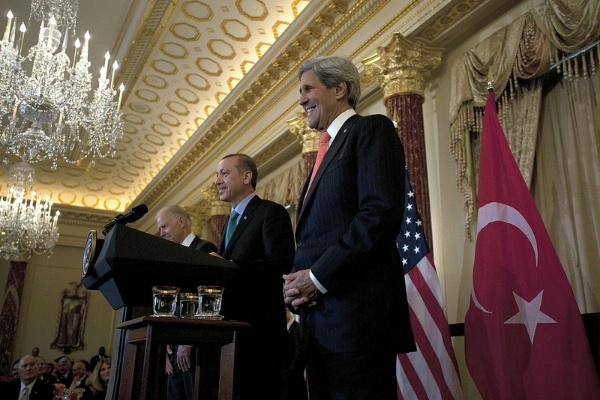
Dissecting Turkey: Our NATO Ally’s Interest in the Middle East
Turkey is seen as key to any fight against ISIS or Assad; it bears the brunt of Syrian migration, controlling the flow of Syrians into Europe, and Turkey’s agreement allowing the US to use its bases for airstrikes against ISIS bolstered US capabilities significantly. Turkey has been active in its own air campaign against targets inside Iraq and Syria, but seemingly with more of an emphasis on striking Kurdish targets than ISIS.
By December 1st, all American allies, including Turkey, made up less than 5% of the strikes against ISIS. Why has the US accepted such an uneven share of this campaign? And why is Turkey more interested in bombing Kurds than they are in fighting ISIS?
To answer these questions means to reexamine the interests of US allies in the region, and to ask to what degree they complement US policy. American policymakers must ask themselves why Erdogan sees the Kurds in Syria as a greater threat than ISIS. After all, it is ISIS and Assad that are causing millions of Syrians to seek refuge in Turkey. In order to understand Turkish policy right now, it is essential to understand Erdogan and his ruling Justice and Development Party (AKP).
Erdogan’s right-wing Islamic party at first benefitted from the support of traditional Kurdish Muslims. [1] Due to the erosion of this support from increased Kurdish alienation and radicalization, the AKP began a “Kurdish opening” meant to solidify its Kurdish base and weaken the PKK (Kurdistan Workers Party). [2] This contentious opening, secret and divisive within the AKP, took on new dimensions after a Kurdish autonomous region in Syria was declared in Rojava in July 2012. Shortly thereafter, the imprisoned Kurdish leader Ocalan was coaxed by the AKP to declare a unilateral cease fire.
Erdogan has been playing three hands at once, separately with the Kurds within Turkey, with the Barzani government in Iraqi Kurdistan, and with the Rojavi Kurds. While Erdogan was successful in building a close relationship with the Barzani government in the hopes of shifting their reliance from Baghdad to Ankara, his separate campaign against the Rojavi Kurds has severely hurt his traditional alliance with Kurdish conservatives at home. The AKP’s campaign against the Rojavi Kurds led to large-scale rioting in Turkey’s southeast and the strong showing of the pro-Kurdish Peoples’ Democratic Party (HDP) in Turkey’s June 2015 elections.[3]

Alan Hilditch / Flickr
After these elections, Erdogan abandoned his policy of domestic conciliation with the Kurds in favor of a more combative stance. While the AKP continues to deal separately with Iraqi Kurdistan, the party has become more confrontational with the HDP and the PKK at home. Nowhere is this clearer than in the AKP’s chilling reaction to the largest terrorist attack in Turkey’s recent memory that struck an HDP rally in October 2015, leaving nearly one hundred dead and hundreds wounded. While the government blamed the attack on an implausible joint PKK-ISIS operation, thousands marched in Ankara to blame Erdogan, who was criticized for not providing any security for the rally, imposing a media blackout, and for the police response, which targeted survivors of the attack with tear gas.[4]
The United States must question whether Erdogan is pursuing what is in Turkey’s strategic interest or the AKP’s. Erdogan’s party has become more overtly Islamic in rhetoric, fueled by its vision of leading a Sunni coalition under an Islamic banner.[5] This shift towards the Middle East is based on the core principles of the AKP’s founders, who believed that the West was in decline and sought to build Turkey into a regional leader on the basis of its Islamic identity.[6] What is Erdogan’s vision for the Middle East, and how does it conflict with American policy goals? The US has essentially reinforced Turkey’s regional ambitions under its call for an increased Turkish regional commitment, without qualifying what that commitment is. Turkey’s past support for Egypt’s Islamic Brotherhood, for Sunni tribes that fought Maliki’s US-backed Baghdad government, and for Islamic groups in Syria all beg the question of how much a blind eye the United States is turning towards Erdogan’s true intentions.
[1] Turkey Transformed: The Origins and Evolution of Authoritarianism and Islamization Under the AKP. Bipartisan Policy Center: (October 2015), 55
[2] Ibid., 55-56
[3] Ibid., 57
[4] Ibid., 58
[5] Ibid., 59
[6] Ibid., 70





